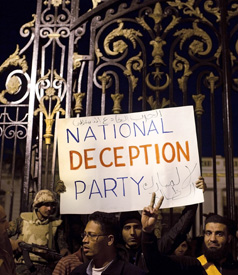After a good start, the Obama administration’s response to the democratic revolution in Egypt has begun to exude the odor of betrayal. Now distancing itself from the essential demand of the protesters that the dictator must go, the administration has fallen back on the sordid option of backing a new and improved dictatorship.
Predictably, it is one guided by a local strongman long entrusted by the CIA, Vice President Omar Suleiman, described by U.S. officials in the WikiLeaks cables as a “Mubarak consigliere.” The script is out of an all-too-familiar playbook: Pick this longtime chief of Egyptian intelligence who has consistently done our bidding in matters of torture, and retrofit him as a modern democratic leader. But this time the Egyptian street will not meekly go along.
The first test was on Tuesday, after the weekend theatrics of Suleiman making a show of meeting with the opposition but rejecting its demands. A huge crowd — inspired by a most modern protest figure, a Google executive — showed up to reject defeat as a compromise. Defeat, because under Suleiman’s plan all of the levers of oppressive power would remain, including Hosni Mubarak as president and a state of emergency denying fundamental freedoms that dates back four decades. Conning the masses with fears of a foreign enemy is a political art form in Egypt going back to the pharaohs, but this time, perhaps thanks to new empowering technology, or just too much suffering, it is not working.
The scenes of the demonstrators in recent weeks have in some ways been reminiscent of those I witnessed in Cairo back in 1967, but their significance is exactly the opposite. Back then, when huge crowds took to the streets, their anger got perversely twisted by nationalist rage into the demand that Gamal Abdel Nasser, who had presided over a humiliating defeat in the Six-Day War, not make good on his threat to resign. The failure of the Egyptian street to hold Nasser accountable for the stark failures of his dictatorship ushered in a 44-year reign of tyranny, corruption and stagnation at the heart of the Arab world.
Mubarak is the final inheritor of that era, the heir to the military rebels who toppled King Farouk and, instead of implementing a too-long-promised enlightened view of pan-Arab nationalism, turned vile bureaucratic corruption into an Egyptian way of life — a corruption that the U.S., Israel and the oil-rich Arab monarchies found very much to their liking.
Help fight ignorance. Click here for free Truthout email updates.
That attitude continues, as The New York Times reported on Tuesday: “Israel, Saudi Arabia, Jordan and the United Arab Emirates have each repeatedly pressed the United States not to cut loose Egypt’s president, Hosni Mubarak, too hastily, or to throw its weight behind the democracy movement.” Once again, as in 1967, the argument is being made that the secular military dictatorship in Egypt is needed to combat radical Islam, as represented by the Muslim Brotherhood, and that democracy might be “hijacked,” as U.S. Secretary of State Hillary Clinton warned.
The U.S. presidents whose military aid purchased the Egyptian government as America’s lackey have known the cost to Egyptians in omnipresent corruption, bribes, torture and political oppression. On the surface, it seemed like a good deal: For a couple of billion dollars per year in military and other assistance, Egypt lined up with Israel in making the post-Six-Day-War occupation of Palestine permanent, and pan-Arab nationalism descended into a bargain between the oil sheikdoms and those without petrol to preserve the bizarrely skewed class divisions in the region.
That the suffering of ordinary folks was well known to American policymakers right up to the moment of the current explosion is documented in the WikiLeaks cables and stands as an expose of our foreign policy cynicism. But it was blithely assumed that the dictatorship would continue in the person of Mubarak’s son Gamal because, as one cable said, “due to the paranoia of the Egyptian dictatorship, no other name can safely or respectfully be bruited as a candidate.”
In the cables, there is no sense of alarm that something might be awry with this planned succession in the Mubarak dictatorship from father to son because the Egyptian elite was quite happy with the arrangement: “Many in the Egyptian elite see his (Gamal’s) succession as positive, as his likely continuation of the current status quo would serve their business and political interests.”
That the young — many of them overeducated for the stagnant job market — and the Egyptian majority that lives in abject poverty, along with all those fed up with life in a police state endured for half a century, might complicate the U.S. alliance with the Egyptian dictatorship was dismissed by the deep cynics who run our foreign policy.
A key cable discussing the enormous unpopularity of both Anwar Sadat and Mubarak, who replaced him 30 years ago, states: “Mubarak seems to have managed the dilemma better in at least one key area: He has systematically and ‘legally’ eliminated virtually all political opposition.”
Our kind of guy?
Robert Scheer is editor of truthdig.com, where this column originally appeared. E-mail Robert Scheer at [email protected].
Copyright 2011 Creators.com
We have 9 days to raise $50,000 — we’re counting on your support!
For those who care about justice, liberation and even the very survival of our species, we must remember our power to take action.
We won’t pretend it’s the only thing you can or should do, but one small step is to pitch in to support Truthout — as one of the last remaining truly independent, nonprofit, reader-funded news platforms, your gift will help keep the facts flowing freely.
